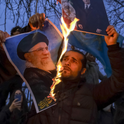I like documentaries, I love Latin America, I am generally sympathetic to left wing politics. I guess this makes me the target audience for Oliver Stone’s new film, South of the Border, but that said, go see it, it is great. No matter what your politics, it is worthwhile to see what a real filmmaker can do with a tired genre.
It starts with a segment from Fox News’ morning show, Fox and Friends. The peppy blonde anchor acts horrified by the revelation that the Venezuelan president starts his day chewing cocoa. She means “coca”, she says “cocoa”, her co-anchors laugh at her, she is clearly confused. This opening clip tells us three things: Fox anchors aren’t that bright; American television doesn’t cover Latin America with any depth and unlike lots of worthy docs, this one is going to be funny.
When I was growing up in 1970s Buenos Aires, with Argentina ruled by General Videla, Chile ruled by General Pinochet and Brazil ruled by a series of interchangeable generals, no one would have guessed that soon enough right-wing dictators would be passé, and that one day all of Latin America would be democratic. This happy transformation, and the incomprehension with which it is treated in the mainstream American media, is the subject of Oliver Stone’s documentary.
Accompanied a small crew using low budget video cameras, Stone travels around Latin America and interviews the left-wing Presidents of Venezuela, Ecuador, Bolivia, Argentina, Paraguay and Brazil. He chews coca with Evo Morales, chats about shoes with Cristina Kirchner and discusses liberation theology with Fernando Lugo, but the star is Hugo Chávez. Using news clips and interviews, Stone tells the story of Chávez’ rise: his failed coup in 1992 and subsequent imprisonment, his election in 1998, the failed coup against him in 2002, and the continued popularity of his regime among the poorer segments of the Venezuelan population.
Many critics have attacked Stone for idolizing Chávez and ignoring his flaws. I suspect Stone would reply that this film is merely trying to restore balance: the rest of the US media demonises Chávez and ignores his triumphs. Written by Tariq Ali and Mark Weisbrot, shot by Albert Meysles, this is a skilfully made documentary: didactic without being tedious, opinionated while remaining informative. Stone is currently working on a ten-part series for HBO entitled “The Secret History of the United States”. I can’t wait.
Watch out Michael Moore: a talented filmmaker is taking on your bailiwick of progressive and popular documentaries, and doing it much better.
Oliver Stone: the new Michael Moore?
August 03, 2010

Hugo Chavez with Stone at the Venice film festival











